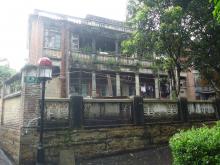04 Oct 1944, John Charter's wartime journal
Primary tabs
For the sake of a record I must put down the current price of canteen goods as they are today. With every fresh delivery of goods from town the prices of some of the articles go up and, when the price becomes too fabulously high, that item is no longer ordered. For instance, the price of a 12 oz tin of corned beef, several months ago, rose to about 35 Yen and then no more was ordered. People who have corned beef in camp and wish to sell it can now obtain about 100 Yen for it!
The value of the Military Yen in HK is quite fictitious and there are about 3 ways of assessing it’s relative value. We have received no I.R.C. allowances since about June, when everyone was given Y12.50. The British Govt sent the money to Zindle through the Red Cross in Geneva and the rate of exchange was fixed between Y16 or Y17 to the pound. People, like the bankers when they came into the camp, were allowed to draw money from their bank accounts and the rate was still at Y1 = $4. The HK gold reserve was sent to England before the war here, so the HK$ is still backed by gold and is still worth 1/3 ($16 = 1 pound) although officially the dollar has been withdrawn from circulation. By that rate of exchange the Military Yen is worth 5/- i.e. Y4 = 1 pound. But people know the yen is really worth nothing at all (when the place is retaken, the notes will be worth only the value of the paper on which it is printed, and in camp here you can get a slightly better value for a sterling cheque i.e. Y5 to the pound. Many people in camp here have sold jewellery for military yen (for which extremely high prices are paid) and rather than have several hundred or thousand valueless notes in their possession, they keep a certain amount for their current canteen and private trading requirements and sell, or exchange, the balance for sterling cheques at the rate of about Y5 to the pound. Most of the money in camp at present is obtained in this manner and the exchange of 5 to 1 is about the most accurate way of placing a value on the yen and for pricing purposes I will adopt this standard.
People who sell yen for cheques in camp run the risk of accepting a dud cheque but that is up to them and most people are, of course, careful about such transactions and would only negotiate with reputable people. For instance, some of the heads or directors of some of the big trading companies in the East are in camp and they, (I believe) have been writing cheques against the credit of their firms and obtaining sums of money in this way, for distribution amongst the employees of their firms in camp. If I had any money to dispose of in this way, I should feel pretty safe in accepting a cheque from such a quarter.
There are other reputable individuals too whom one could safely trust to honour their cheques afterwards. Not that Y and I are contemplating any such transactions – our problem is always to keep ourselves supplied with sufficient cash to make our weekly canteen purchases! The Japs, unofficially, know all about this trading of jewellery, but they wink at it because, I imagine they are all in the game and doing pretty well at it! But I will say more about this later. Now I must write down the last list of canteen goods.

